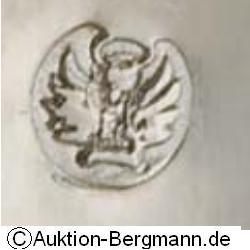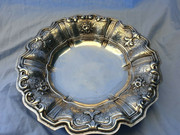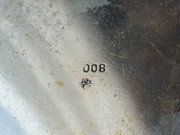After a long time it seems to me appropriate to return to the suject to add some considerations.
Some time ago I found this coffee pot on a market, and, since I recognized the mark that had posted Teoderich, I bought it.


To be honest the seller did not say it was a piece of the XVIII century, and sold it at a price appropriate to an old-fashioned object.
Once at home, I looked at it better, and I had a lot of doubts:
In Milan in the 18th century the objects had only the silvermaker''s mark (SAMBONET PAG 7), and here there are two different marks: suspicious.


The style of the coffee pot is Venetian, not milanese.


The body of the coffee pot has a vertical welding and is therefore not hammer rised from a single piece, even the spout is welded on.The handle is welded to the body but has fake rivets for embellishment.
These clues and the lack of patina convinced me that this is a much more recent object, probably made in the early twentieth century, and that are fancy marks.
In addition, in these two years I've seen on sale at least five objects with the same mark that is on my tray.
It seems strange to find so many Croff's artifacts and so few of the many other Milanese silversmiths of that time.
I hope that my tray is genuine, but I would not bet, and for sure and I will not buy any other objects with that mark.







